Library
All resources
1541 – 1560 of 2421 results
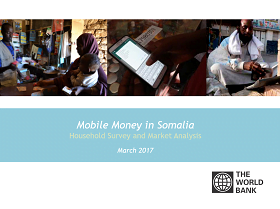
Mobile Money in Somalia – Household Survey and Market Analysis
Report
Key findings from an assessment of mobile money in Somalia. Provides information about mobile money penetration; practicalities; usage; perceptions and the use of shillings versus dollars.

Humanitarian Cash Transfers in the Democratic Republic of Congo
Report
The Democratic Republic of Congo (DRC) is at a crossroads with regard to cash transfers. On the one hand, cash has been accepted by most donors and aid agencies as an appropriate response, with solid evidence underpinning its use. Aid agencies have driven important innovations in an environment where...

Community Based Targeting Report
Report
The current study aimed to gain a comprehensive understanding of SEV from the community’s perspective and to assess the targeting practices implemented by cash actors in Lebanon. It demonstrated that, according to the community, HH size had an impact on vulnerability, but that that depended on its...

Baseline Survey for Project Output and Livelihoods Support Assessment
Report
This report highlights the baseline findings of the UNHCR funded project “Increased self-reliance through cash interventions and livelihoods support to conflict-affected South Sudanese refugees in Bidibidi refugee settlement and host communities in Yumbe District in Uganda” implemented by...

Electronic Transfers in Humanitarian Assistance and Uptake of Financial Services
Report
The Electronic Cash Transfer Learning Action Network (ELAN) undertook case studies on humanitarian electronic transfer (‘e-transfer’) projects in Ethiopia, Zimbabwe and Bangladesh. The case studies examine the extent to which: recipients used digital financial services (e.g. money transfers, savings,...
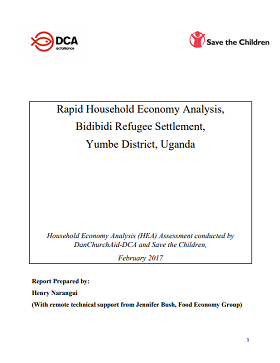
Rapid Household Economy Analysis,Bidibidi Refugee Settlement,Yumbe District, Uganda
Report
Yumbe District (Bidibidi settlement) hosts about 272,2061 refugees from South Sudan. An influx of refugees to Bidibidi settlement, Yumbe District, took place starting from August 2016 due to the increased conflict, scarcity of food, and subsequent financial instability caused by hyperinflation in South...
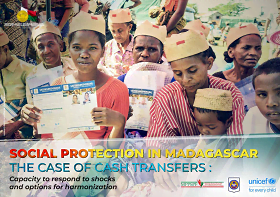
Social protection in Madagascar – The Case of Cash Transfers: Capacity to respond to shocks and options for harmonization
Report
The report has been prepared as commissioned by the Government of Madagascar (Ministry of Population, Social protection and Women’s Promotion and the National Office of Risk and Disaster Management) in coordination with the members of the emergency cash group and with UNICEF’s funding and technical...

Can E-Transfers Promote Financial Inclusion in Emergencies: A Case Study from Ethiopia
Report
The Electronic Cash Transfer Learning Action Network (ELAN) launched this research to build an evidence base around connecting emergency electronic transfer (e-transfer) recipients with additional financial
services. They also wanted to learn if, when, and how e-transfers can promote sustained uptake and...
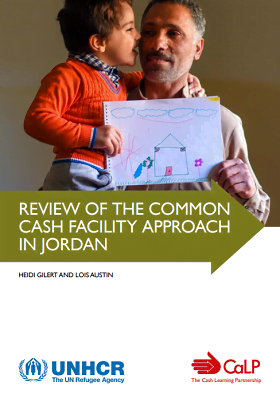
Review of the Common Cash Facility approach in Jordan
Report
The United Nations High Commissioner for Refugees (UNHCR) in Jordan has pioneered a collaborative, multi-stakeholder approach to the delivery of cash, known as the Common Cash Facility (CCF). The aim of the CCF is to provide humanitarian actors with direct and equal access to a common financial service...

Policy Briefing: Electronic Transfers in Humanitarian Assistance and Uptake of Financial Services
Report
The Electronic Cash Transfer Learning Action Network (ELAN) undertook case studies on humanitarian electronic transfer (‘e-transfer’) projects in Ethiopia, Zimbabwe and Bangladesh. The case studies examine the extent to which: recipients used digital financial services (e.g. money transfers, savings,...

The Livelihood Impacts of Cash Transfers in Sub-Saharan Africa: Beneficiary Perspectives from Six Countries
Report
Cash transfers (CTs) are a social protection mechanism to reduce the poorest households’ vulnerability to shocks and build human
capital by smoothing consumption and sustaining expenditure on education and social welfare.
This study examines whether and how CTs go beyond welfare objectives to promote...

Scaling up CTP in Somalia: A focus on: CTP options in a changing funding landscape and Improving the use of lesson learning
Report
This report summarises discussions that took place during a half-day event in November 2017. The event built on discussions in September during which a myriad of issues were highlighted and many opportunities for collective action noted. This meeting focused on a more in-depth discussion on two issues...
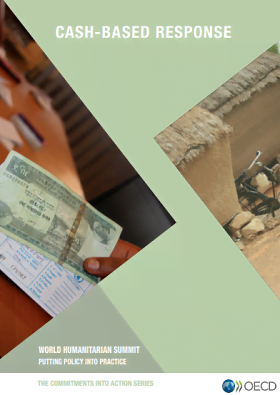
Cash-Based Response- OECD Commitments into Action Series
Report
The use of cash in humanitarian response is not new. What is new, notably after the World Humanitarian Summit and the Grand Bargain, is the policy momentum for using cash as a primary option in responding to humanitarian needs. There is a growing body of evidence demonstrating its multiple benefits as...

Using Cash and Vouchers in Somalia in 2017: The Need to Build on Learning from the 2011-12 Somalia Drought Response
Report
During the 2011-12 drought response in Somalia, cash and vouchers were distributed at scale – a response that was unusual in such a context at that time. In 2017 cash is accepted as highly appropriate and is a major part of response plans. While it may not always be possible to apply all best...

Partnering with Mobile Network Operators in Zimbabwe to Deliver Cash Transfers
Report
This case study seeks to investigate and document the following: The process of engagement between MNOs and CARE. Clarity of roles between CARE/WVI as implementing agencies and MNOs. Successes and challenges in the partnership between CARE/WVI and the MNOs Measures taken to manage the impact of the...

Cash Transfers for Refugees – An Opportunity to Bridge the Gap Between Humanitarian Assistance and Social protection
Report
The world is now experiencing the biggest refugee crisis since the second world war. Many of the countries with the highest outflow of refugees are facing ongoing conflicts that are unlikely to end anytime soon. In fact, most displacement crises are protracted, with 80% lasting ten years or more. The...

Karamoja Market Assessment
Report
A market assessment of the feasibility of cash transfers in the Karamoja region – Executive summary

Multisectoral Basic Needs and Market Assessment Moyo Uganda
Report
A multisectoral basic needs and market assessment done in Palorinya settlement and the host communities within Moyo district. Focuses are on basic needs and cash feasibility, the education system gaps, the firewood issues and access to loans and credit.
Data were gathered in December 2017, with...

Cash Tranfers for Food Security in Epidemics. A Review of the USAID Food for Peace Response to the Ebola Crisis in Liberia and Sierra Leone
Case Study
Over the course of 2015 and 2016, the United States Agency for International Development/Food for Peace (USAID/FFP)-funded cash transfer programming (CTP) in Liberia and Sierra Leone reached over 500,000 crisis-affected people with a vital lifeline to tackle food insecurity. Monitoring data indicates that...
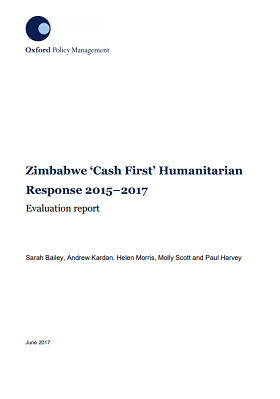
Zimbabwe ‘Cash First’ Humanitarian Response 2015–2017: Evaluation Report
Report
CARE International and World Vision International (WVI) in Zimbabwe implemented the UK Department for International Development (DFID)-funded project ‘Emergency Cash First Response to Drought-Affected Communities in the Southern Provinces of Zimbabwe’ from August 2015 to April 2017. The project...